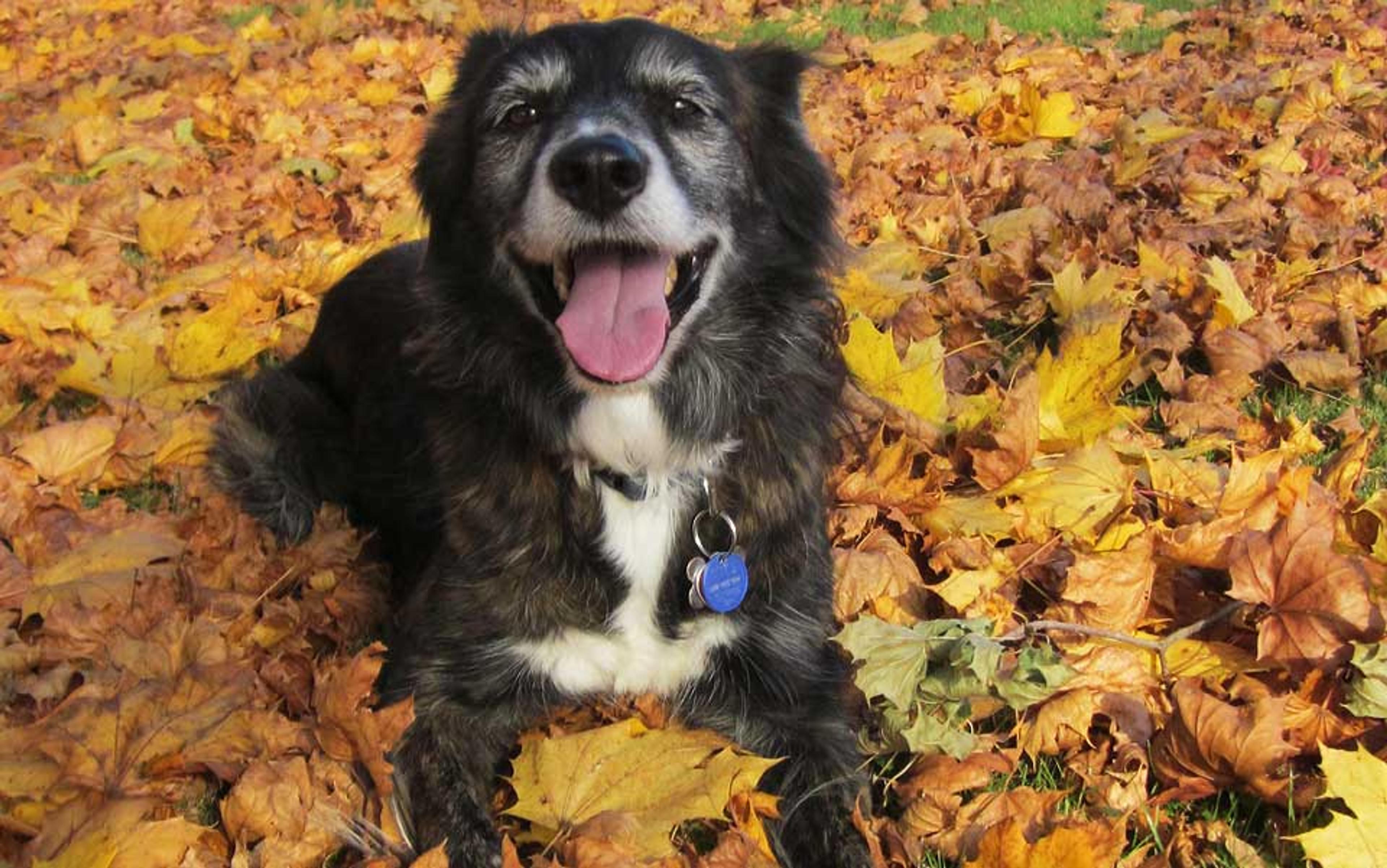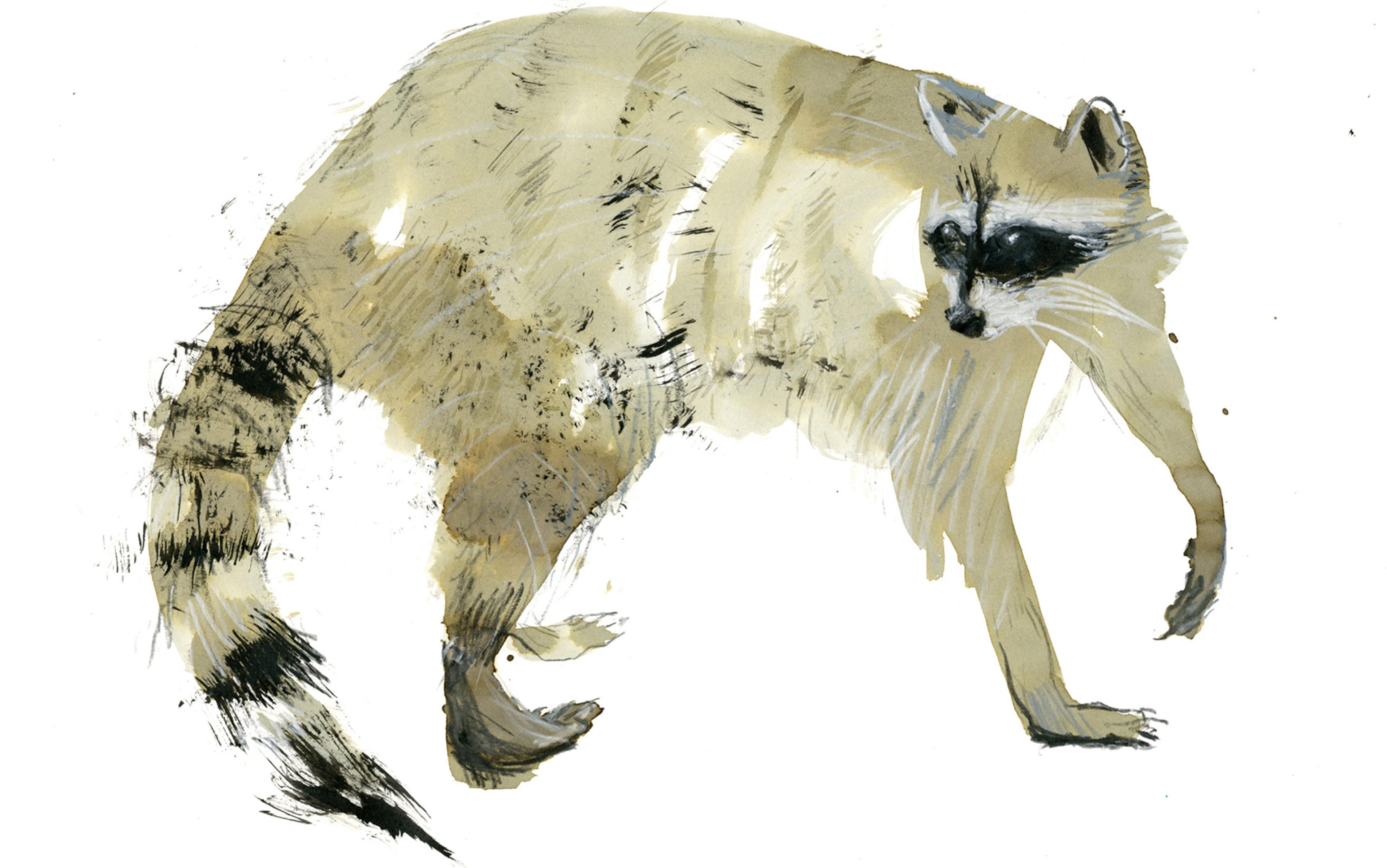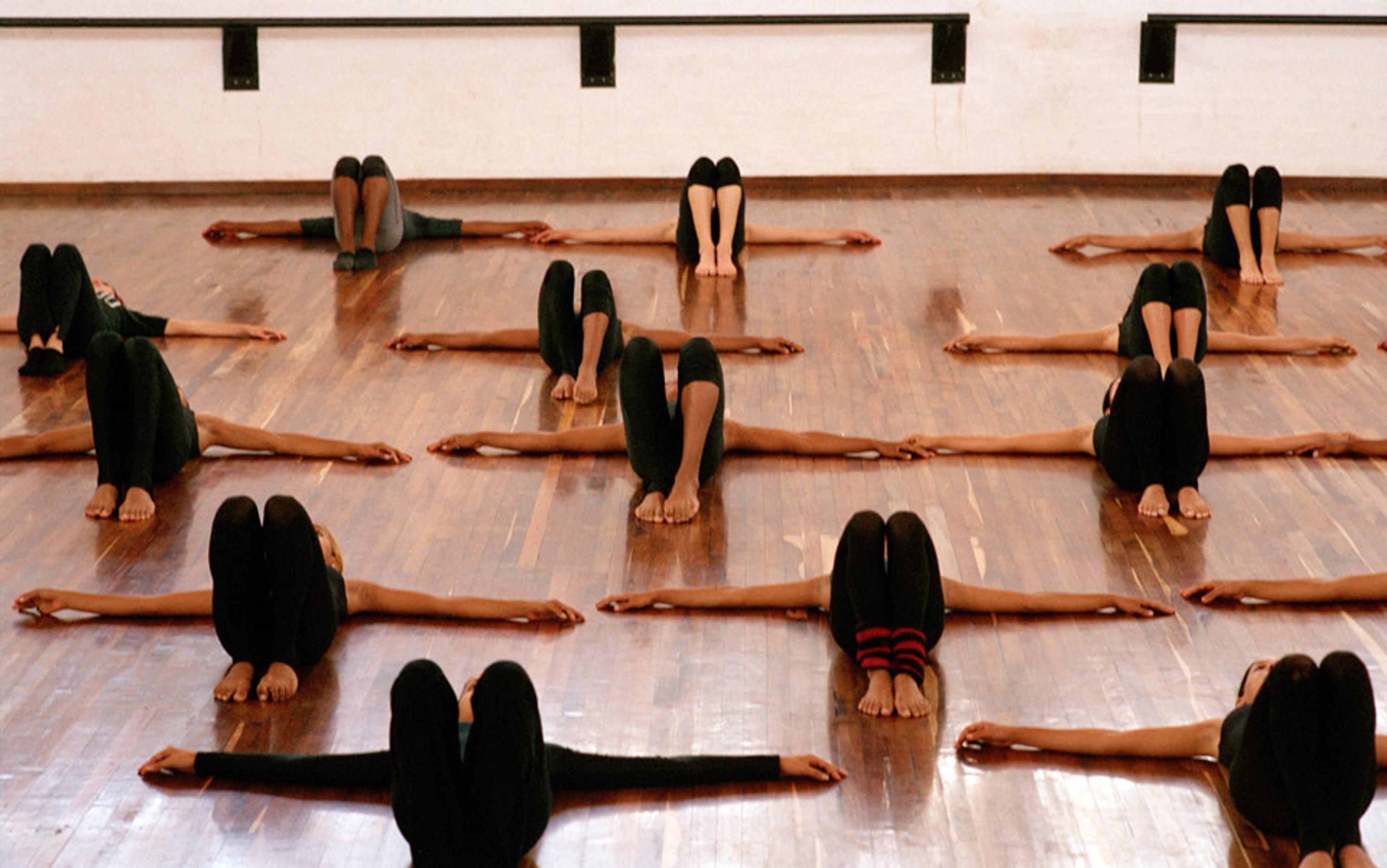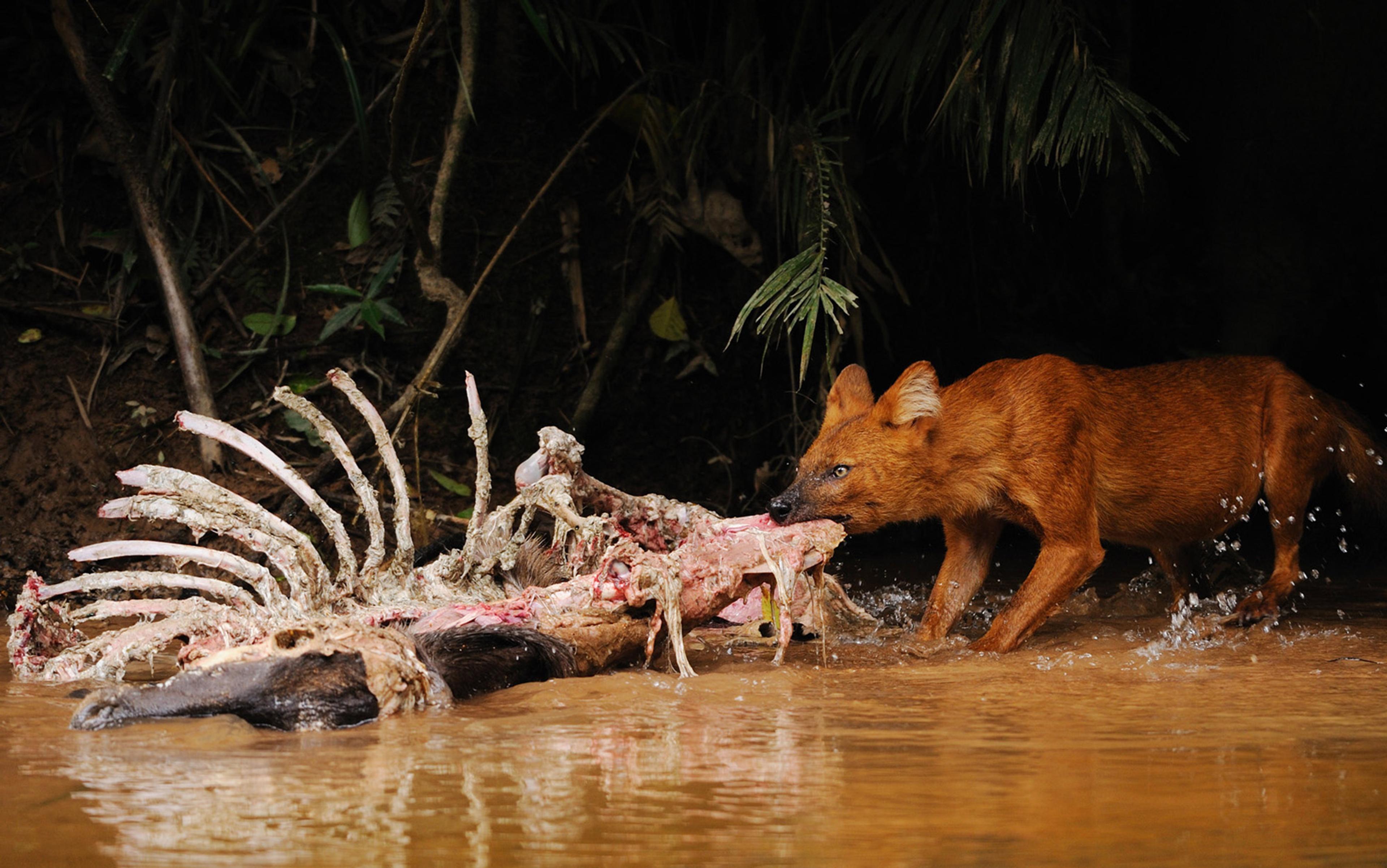The cyclist takes me by surprise, and the thoughts that had been swarming inside my skull — That lesson this morning was a disaster. How am I going to salvage the leftovers of that disgusting dinner? — suddenly scatter. But Cooper saw him first, and I have no chance of heading off his reaction: twirling on his hind legs, he lets loose a frantic bark before tugging with all his might to get free and chase his quarry. Cars pass slowly as I try to extricate the leash from his mouth, and his growling matches the intensity of my injunctions. Finally, the spell is broken: the cyclist is gone, the leash goes limp, and Cooper lifts a leg against a snowbank to punctuate the experience.
The first time I saw him, Cooper was being led on a tight leash by a trainer in the parking lot of the local animal shelter. My wife and I were a couple years out of college and employed at good-paying jobs. We’d completed the transition into adulthood by buying our first house. Adopting a dog seemed to be the next logical step, a sign that we were mature enough to take care of another creature. Cooper’s picture on the shelter’s website showed him panting wildly, his eyes little more than black slits, and he looked much the same when we met him: a shaggy blur of boyish vitality, pressing himself into our legs and jumping up to steal kisses before being jerked back down. ‘He’s got a lot of energy,’ the trainer told us cagily, but by then we’d already made up our minds. He was our boy, the perfect addition to our lives.
Cooper’s antipathy for cyclists was one of many quirks we discovered in short order. He’s a Border Collie mix, and the part of his brain that’s hardwired to herd sheep and goats sends him into a frenzy at the sight of a jogger, a cyclist, or a dog approaching.
At home, his instincts are also problematic: Cooper is fiercely opposed to my crossing a room in front of him, and finds a way to worm himself between my wife and me when we hug or kiss; he’s banned from the bedroom because of his propensity to lurk in the darkness and pounce on anyone who enters after him. He has an unwavering sense of what belongs where, of who is allowed to do what, and he enforces these rules the way he would with a herd of wayward goats.
The pressure of these responsibilities weighs heavily on Cooper. For him, the world is an endlessly threatening place, full of pain and fear and uncertainty and cyclists. He feels charged — by destiny, nature, breeding, or some other force only he can understand — with guarding himself and his adoptive family, with bringing order to the chaos. ‘I’m only doing this because I love you,’ he seems to say as he flops on his dog bed after barking at a passing car or nipping at our ankles.
My wife and I have yet to succeed in convincing him to abandon his post, but we manage these quirks as best we can. When we moved out of our relatively busy suburb, we chose to rent in a sleepy farming town where the level of daily stimulus was considerably lower. Our new house has a sprawling yard where Cooper can play fetch until he collapses, after which he’s usually too tired to keep tabs on the foot traffic through the kitchen or living room. We rarely have guests, and we avoid dog-sitters and daycares. He has managed to herd us in ways far more profound than simply pouncing when we cross a room without his permission.
Despite our efforts to be more Cooper-friendly, and despite Cooper’s success with learning tricks and commands, we’ve needed to enlist professional help for his more problematic behaviours. We dutifully followed various trainers’ advice to buy every manner of harness and collar on the market, all promising an immediate end to pulling on the leash. With each trainer, we added a new device to our dog closet, now overflowing with clickers, agility equipment, and an assortment of multi-coloured nylon straps and metal accessories, all abandoned, most punctured by toothmarks.
Even as we vowed to start ‘cracking down’ on Cooper, I knew I couldn’t go back to the prongs and domination
The trainer who gave the best results was the one for whom I had the most mixed feelings. He came recommended by a local shelter where he trained their most aggressive dogs. From the second he walked into our home, he exuded confidence; his body language, his posture, even the way he framed sentences all sent a perfectly clear message: he was in control, a master of his domain, and that domain extended to wherever he found himself. Naturally, much of his initial evaluation of Cooper was an evaluation of me — my posture, my body language, the way I framed sentences, all of which sent a perfectly clear message: that I wasn’t in control. Even though I was still in the shirt and tie in which I’d commanded the attention of teenage students throughout the day, I suddenly felt I was wearing a costume: that the well-adjusted adult who’d met Cooper in the shelter was little more than a kid parading around in oversized shoes.
Cooper wasn’t an alpha dog, the trainer explained: his aggression and problem behaviours didn’t stem from a need for dominance, but from insecurity and anxiety. As a working breed, Cooper craved order, structure, and leadership, but when he didn’t get them, he tried to create them himself, usually with ugly results. We needed to take charge, the trainer explained, and put Cooper in his place — not just to improve our quality of life, but to improve his: so he could relax and let his guard down for once.
We began a new regimen with the trainer. After a few painful ‘corrections’ with a prong collar, Cooper slunk along behind me, glued to the floor, panting like he’d just spent an hour playing fetch. ‘He’s just getting used to his new role,’ the trainer said, beaming. ‘It’s a little stressful.’
Over time, Cooper began to linger behind me on walks without any corrections and, at his best, merely whimpered when we passed one of his usual triggers. But there was still the problem of his behaviour at home. The trainer had equally aggressive approaches to these issues and, despite our reservations, we kept them up.
Increasingly, however, we became inconsistent with the posturing and commands we were supposed to use. Cooper saw his opening, and started backsliding too, but my unease about the trainer’s methods had taken deeper root. Even as we vowed to start ‘cracking down’ on Cooper, I knew I couldn’t go back to the prongs and domination. I felt hopeless: the kind of confidence the trainer had seemed completely inaccessible to me. Even when I pushed my shoulders back and dropped my voice an octave, I knew I was faking it, that my skittish and squirrely brain betrayed me somehow; worse, Cooper knew it. The trainer had been right about one thing. Cooper was essentially a projection of my internal world, his anxiety, insecurity and lack of faith in me were products of those same characteristics in myself.
Before I could hope to have any success with Cooper, I had to master the self-doubt, and passivity that prevented Cooper from seeing me as anything but another animal to herd. I needed to train my brain before I could hope to train my dog.
I began meditating with the same attitude with which we had attempted to train Cooper: I wanted obedience and mastery of my brain, and I wanted it quickly. I set online mindfulness bell timers, but always crumbled after seven minutes or so. I congratulated myself for noticing a thought and letting it go, only to realise that it had been replaced by a lyric from a Wu-Tang Clan song on a loop. I practised eating mindfully, walking mindfully, and doing the dishes mindfully, despite the fact that my ham-fisted monomania with these tasks made me oblivious to anything else around me.
I chased enlightenment as I paced an invisible labyrinth in the backyard; Cooper chased a squirrel up the tree. I kept a relentless vigil of my in-breaths and out-breaths; Cooper’s ears perked up with each sound that warranted his investigation. I jerked my wandering attention back to my breath and jerked Cooper’s leash to keep him out of the tick-infested grass. Our walks became opportunities for some of my most strict practice. When Cooper still lunged, still bit his leash, still twirled on his hind legs, my corrections became harsher than ever, mirroring the corrections I gave myself for falling short of my spiritual ambitions.
Cooper chased me around the house the same way I chased my mind, forever trying to bring it back where it ‘belonged’
Frustrated with my lack of progress, I lost whatever patience I’d tried to cultivate on the meditation cushion. Overwhelmed by ceaseless news of social and environmental injustices, I began to feel that detachment was an irresponsible cop-out. Lured by the chance of a few extra minutes of sleep each morning or a few extra mouuthfuls of food before my stomach realised it was full, I stopped listening to my breath and my body. More than anything, though, I needed to relax, to let my guard down. I was tired of returning my attention to my breath, of dragging my mind back to the shirt I was ironing as my thoughts wandered to a pleasant memory or a future conversation. I thought about Cooper, about the exhaustion in his eyes as he raced across a room to beat me through a doorway, about how he chased me around the house the same way I chased my mind, forever trying to bring it back where it ‘belonged’. I wondered if what I wanted, and maybe what Cooper needed, wasn’t more training, but less.
Yet, as far as I strayed from my mindfulness practice, the path was never more than a few steps away: I’d catch myself making a deep in-breath at a particularly stressful moment at work, or noticing the softness of the earth through the soles of my shoes on a walk. I’d suddenly become aware of the tension in my jaw, brow and mind, and soften them with a half-smile. These passing moments might not have been moments of enlightenment or crystal-clear concentration, they didn’t stop me from getting soaked as I rushed through my post-dinner dishwashing, but they were welcome moments of peace in otherwise chaotic days.
Without really planning to, I began to practise again, but this time I found myself holding my practice loosely, catching my mind drifting at odd moments, and being amused rather than annoyed at my inattentiveness. I was no longer convinced that I was a lost cause. Eventually, I made my way back to the meditation cushion, but without the timer, the online mindfulness bells, or the expectations. The path was no longer a bulldozed road through an unruly jungle, but an ambling trail through varied terrain, every twist and turn worth stopping to watch, listen, smell, veer away from, and return to. I relished it the way Cooper relished those rare occasions when I was brave enough to take him hiking.
My new training practice for Cooper still involves training: he heels, lets me walk through doors before him, and gets corrected when he springs up at my chest. He gives paw, rolls over, and occasionally lets us close his crate without losing his mind. But he also slips in front of me on walks, goes berserk in the car, and can’t stand the sight of a bike. His stir-craziness still gets the best of him when he can’t get his daily fetch session. Part of my practice is trying to provide discipline and structure as an expression of love rather than control and dominance, to recognise my own shortcomings as a trainer with good humour rather than embarrassment and hopelessness, to see even Cooper’s worst behaviours through the eyes of compassion. I try to remember that in one moment he might be a terror, but in another he is a love; in another he is a puppy, and in another he is a white-faced old man.
Buddhism teaches us that suffering originates in a desire for things to be something other than what they are. Both Cooper and I know this suffering all too well. He spends his days trying to herd anything in motion, seized by a neurotic need to impose an order only he understands; I spend my days doing similar work in my own head. This desire informs the self-improvement kicks and the shredded journals, even the activist work that’s defined most of my life so far. But whatever fleeting satisfaction we might feel when we get our way, we’re both happiest when we let our guards down: when Cooper rolls onto his back and lets me run my fingers through the white fur of his belly, when neither of us has anything else we’d rather do or be, when there’s nothing left to herd, chase or correct.
Cooper will probably never get used to passing a dog on his walk or taking a drive to the vet, in the same way that I’ll probably never lose the forgetfulness and self-doubt that brought me to the meditation cushion in the first place. But this morning, as the ice melts around his paw prints, and the leash goes loose in my hand, the cyclist disappears from view and we’re enjoying our walk together.





